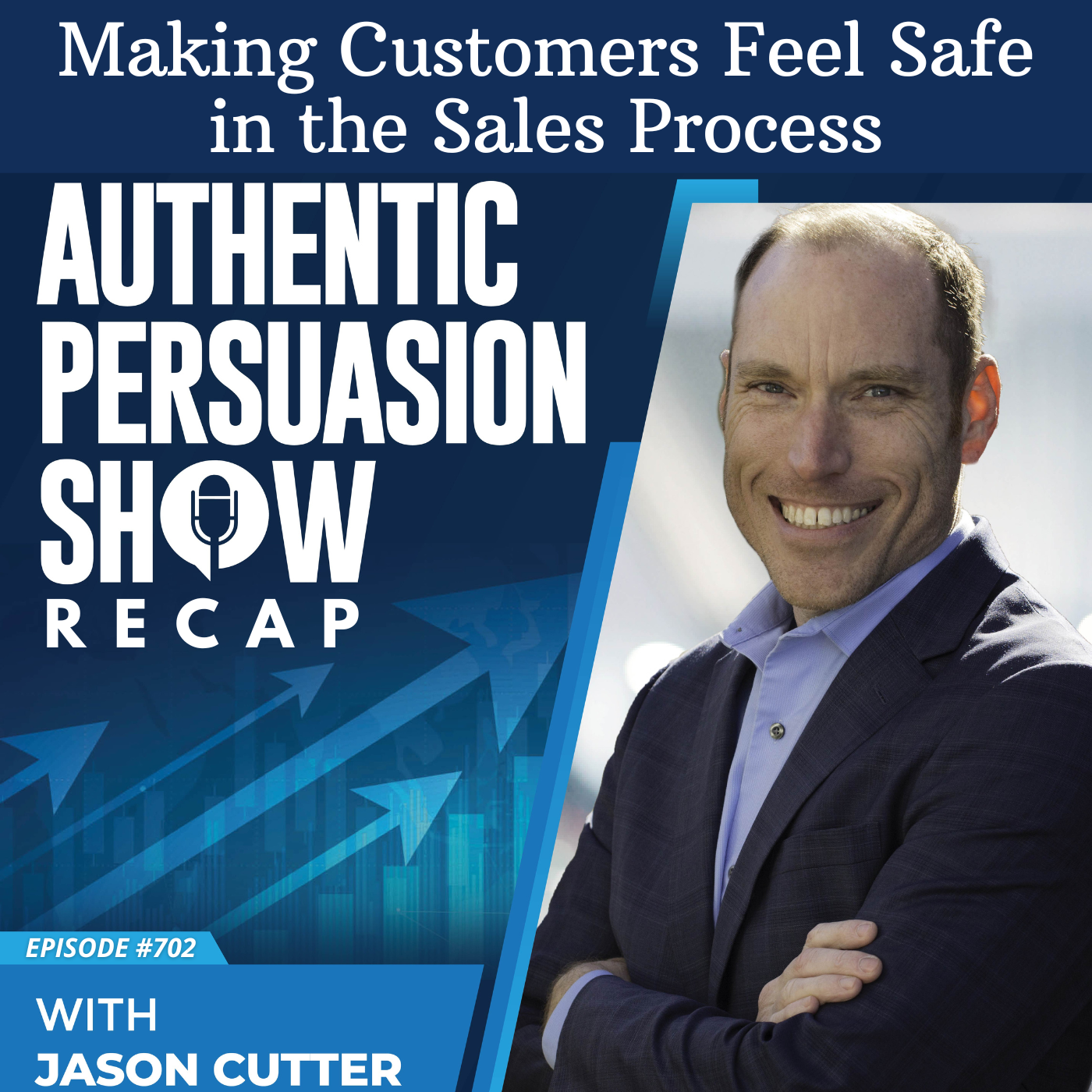Episode Transcript
Jason: Welcome back to the sales experience podcast. Welcome to part four. The final part of my conversation with Daryl Prill. If you have been following along and listen to all the episodes, we are going to wrap it up here with basically his tips, his suggestion on what a CRO actually what a CEO should do in bringing in a CRO and how to set that up.
Lots of good value. Make sure to support him, his podcast, his work that he's doing in the sales and marketing community. And of course, subscribe to this show, share this with anyone, that's in a marketing role, a sales leadership role, a CRO, as well as CEOs who want to grow this. Please share this message.
And of course, if they need help, if there's anyone you know out there that needs help, let me know. I would love to chat with them as well. Here you go. Part 4. Enjoy.
Darryl: You want reps to do butt, butt, butt. You want reps who are hungry and chasing deals and they want to be king of the hill. You want that.
I continue to refine.
Jason: And that's what I'm always telling clients and various managers and owners I deal with is that theoretically, if you have a really good salesperson on your team, as long as they're aligned with your culture and their intentions, and it's a good fit for your values and the company's values, you've got to understand and appreciate.
When they're pushing back, when they're selling you, when they're overcoming what they think are challenges or objections coming from management, because that's what you want, right? You don't want them to be an order taker pushover on the phone with prospects. And so you also can't expect them to not.
Bring that into meetings and conversations when they want to try to get their way. They're a salesperson, right? You nailed it.
Darryl: That's exactly it. And I remember having this conversation with my CEO and it was a really, we had many times to your point, I would use an abbreviated version.
I would say to David, I would say, David, I need more Oracle reps. I need my reps to be more Oracle and he's you sure you want that? They're all I make. I know exactly what you're saying because it's a cultural thing, right? Because I'm using Oracle as a cliche. Maybe Oracle is much better now.
But the Oracle I grew up with in the last 20 years is very cutthroat, very aggressive very type A. And push, push push, push. Because they're selling enterprise software. It's six and seven figure deals and eight figure deals sometimes for ERP, etc. So they're playing hard to win.
And they will step on you if they view you as no longer adding value to go up one. It's a mix. I want more Oracle reps, but I want integrity and character. I'm not sure that mix exists, personally, but we're working it.
Jason: And what you want is Oracle reps, integrity, doing the right thing, empathy, but also powerful closes who also just take your orders and run with them and don't push back on you.
Darryl: And if you just heard what Jason just said, send your resume to me right now.
Jason: Darryl at Vanilla Soft. com. Is that what it is? I'm listening. Please reach out to him. In thinking about all this and looking at this challenge that you have and this mission and kind of the fun part. Companies out there, one of the fundamental issues I see and because this started with the presentation that you were doing.
Two marketers about aligning and that, classic sales versus marketing battle. And so I'm hoping their sales leaders, organizations, owners listening to this and they're inspired and going, okay, what we need is that let's evolve to a CRO who can tie everything together. Or even if it's not a chief revenue officer, it's a something revenue.
Ops head at any scale.
Darryl: I'll go one step further, right? Cause what you're saying is a thousand percent correct, but not every company is big enough or ready for a CRO, right? Fair enough. Okay. Some of you guys aren't going to I'm about to say, Mr. Or Ms. CEO, if you are big enough for a CRO, but you need alignment between your sales teams and your marketing teams.
It's incumbent upon you to do that. You are the CRO, even though your title says CEO. Stop abdicating. Stop letting the kids try to figure it on their own. That's my harsh medicine for the day.
Jason: And it's so true, right? Like people always ask me, how do you fix that? I said, it always starts at the top. And I think I've never thought about it that way, but the organizations where there is sales versus marketing is because the CEO has abdicated.
They're off playing chief executive officer. And they're allowing the chips to fall where they may. And then everyone's egos and personal stuff and just people, humans being humans, gets in there and there's no mediator and there's no umbrella kind of leadership.
Darryl: I get it. You look at president Trump, right?
President Trump has this public state approach that he likes conflict in his leader. So when he's got his lieutenants, he wants them in the oval office to be scrapping over stuff. Okay, he's the CEO in that picture. That's his style. We can sit back and reflect and say, does that work? Personally, I believe scrapping in private is perfectly cool and acceptable.
But once you open that door, we're all on the same team. We've determined the play we're about to execute. Nobody deviate from the playbook, right? That's why I point, if you don't have a CRO, it's up to the CEO to play that role to make sure that everybody's aligned. Because if you rely upon the sales leader or the marketing leader to come together on their own, chances are it's not going to happen.
One will want to, most often. The other one Won't, or they'll want to, but on their terms, which are completely self serving, they're not looking for a compromise. They're not looking for a compromise. They're looking for I win, you lose. And that doesn't work out.
Jason: One thing I've seen is that sales people worry about only being able to win if they use manipulation tricks, tactics, and hard closes.
So they end up struggling to close deals. Make their quota or earn the kind of money that they want to make. If this sounds like your current situation or maybe you want to make more money in sales without feeling like you're selling, then my upcoming book called Selling with Authentic Persuasion will help.
In it, I'm going to take you on a journey to transform from order taker to quota breaker. If you're ready to become an authentic persuader, crush your goals and create success in your sales career, then go to Jason cutter. com again, that's Jason cutter. com and pre order the book today. I had a Maya Conant on the show and she's a CRO.
And one of the things that she brought up is that what happens like when she started out is. There was history right between sales and marketing a meeting a year ago. John didn't like Kim's idea and said something negative and hurt somebody's feelings. And now that baggage is there. And even if I want to be friends with you and align us, then something happens.
Feelings get hurt. It creates a rift. And then nobody knows why that rift is there. It's just this feeling and this vibe. And sometimes bringing in something new can help because they don't have the history. They don't care. I don't care if somebody hurt your feelings a year ago. Like we have a mission.
Let's be successful.
Darryl: And that's also though why I created the RevOps team. Like we already had marketing ops and sales ops. I'll put them all together. And it was specifically so that we had data. So in your example. Maybe there's bad blood between two individuals a year ago, and no one knows how we got here, but here we are.
We can either replace them, spot on. Sometimes those people are irreplaceable because of their tribal knowledge or what have you. Okay, no problem. It's like a child. Then what I need to do is I need to change their behavior, and I need to make sure, for some, it's a timeout. For others, it's corporal punishment.
I'm going to, whatever. For others, it might be, I'm taking away your iPad. Who knows? The data that you get from the RevOps, eliminates the he said, she said, eliminates the interpretation. I can say, no, look at here is your leads that you've given sales, Mr. Head of Marketing. And I can tell you that the lead quality sucks or blah, blah.
I can, here's the numbers, right? So you can point at sales all you want to, but you're not free here. You got problems. And then I can turn to sales and say, they don't feel gloating at marketing person over here. You're attrition, you're ramp time, whatever it might be. Here's the data. The data doesn't lie.
So the data becomes the arbiter. And that's why I love having data. And I'm not smart enough to pull that data together, but I'm smart enough to get the people who are smart enough to pull that data together. Even to the point that they send me wonderful charts and everything. And most people would take the charts and they themselves would open it and peruse it.
Yeah. I'm not that guy. It's in the charts and I say, okay, let's have a meeting. Walk me through the chart because I don't want to assume I know anything. I want to hear the story behind the numbers.
Jason: They thought worthy of my seat. And that was the thing that Maya actually pointed out too, was. The data is important.
It eliminates all that, right? It's no longer subjective. It's very objective. It's very direct, but then also her point, which was fascinating. And it's what you're talking about, too, which is the transparency of the data and the more live the data is, the less the data can be manipulated or stories being told or spun to protect somebody's position instead of here's the numbers.
Now, Let's have an honest conversation so that everybody can win.
Darryl: And that's part of the reason we are, we're implementing salesforce. com because we didn't really need it. My whole sales organization lives in vanilla soft and does a bang up job, but we have a federated tech stack. So sports got Zen desk, success has got churn zero.
Accounting's got NetSuite, marketing's got HubSpot, sales has got vanilla soft. All right. You know what? I'm just gonna put salesforce. com across the top and everybody can plug in. And now I've got one. Holistic view and at the same time I can also log in and I can see, Oh, somebody's late on their payment or somebody's had 42 support calls.
I wonder if they're not happy. Look, success is pointed. This guy's got a net promoter score of five. We should be doing something about this, that kind of stuff. So it was again. So we had a single record of truth that everybody can see for that wonderful word that Jason used.
Jason: Final thought, final comment.
What is the one thing you would want? Let's say a CEO who's going to put in a CRO position, right? So they're at that part. They've evolved. They're ready to go. They want to put in a CRO. What is the one? Because I'm sure you have 94. What is the one suggestion or tip or thing that they should know? To help that CRO position be successful, not just the person, but the position.
Darryl: So if you're going to implement a CRO that has a heavy bias towards one discipline, sales, then don't put in a CRO. Because there's, make them the VP of sales. Because they're a default to what they know. Alright, I mentioned I've been a VP of sales, hadn't carried a bag in 10 years, so that's a bit of a risk.
I know marketing, I'm in the sales community, I talk to sales leaders, I talk to industry analysts, I talk to the reps. I have pretty good ideas. No one person will ever be perfect. Clearly, I'm better marketing than I am in sales. But I've got enough of a balance, and I understand the process, both sides, that I can be Switzerland.
I can be neutral. I can hold each team accountable and make sure this friction is gone. The challenge is, too many CEOs think they understand the craft. They think they understand marketing. If you talk to them, in their world, marketing is just press releases and great parties and trade shows. That's it.
Or they think they understand sales, even though they themselves have never picked up a phone in their life to make a phone call. They actually do a cold call, right? You want somebody who's got foot in both camps, who is knowledgeable enough and experienced enough, or at least educated and informed enough.
Know them minded enough to know what they don't know and get those answers before they make a decision. If they're going to default and bias to what they know, if they only bring one skill to the table, they should not be CRO. That means you have to really interrogate them, make sure you understand, do a great background check.
That also means you need to be honest with yourself. If you think you know marketing, you think you know sales, but you've never picked up a phone, you've never actually done anything other than have your name appear in a quote in a press release, then you need to get outside experts to supplement your knowledge to vet the CRO candidate.
And frankly, as a CEO, that's what you should be doing. The pressure's not on you to have all the answers. The pressure's on you to resource the answers and then to lead by example. So that's my advice.
Jason: I love it. That's perfect. That's a great place for them to start and really makes sense. Especially the biased part.
As far as where people can find you, I know the best place historically, except recently, has always been LinkedIn. Anybody that wants to find Daryl, it's Daryl Prail, P R A I L L. Go to LinkedIn. You were super active. You've taken a CRO mental hiatus because of how busy you've been. You've disappeared from there, but there's a lot of great content, especially if people want to go historically.
Also, people can email you. Daryl. Prayle at VanillaSoft. com. Is there anywhere else where you're active right now? Any good resources?
Darryl: I'm active on Twitter, too. You can go to my own website, DarylPrayle. com. The simplest method? Just go to Google, type in Prayle, and you'll find every location that I've ever been at.
You'll also find a Prayle from Alberta, Canada, who apparently killed her mother. No relationship to me, but it's a great story. So it's a win.
Jason: There we go. Lots of good stuff. And you're in Canada as well. And so it makes sure it's the Canadian press. Something about that. I don't know. You got it. Yeah.
Darryl, thanks for being on the show again, coming back and with some new information, new kind of experience. Super excited to see what you do, but thanks for being on the show.
Darryl: Jason Cutter, killing it in the hallways. Thank you, sir.
Jason: That's it for another episode of the Sales Experience Podcast. Thank you so much for listening.
If you find yourself on iTunes, can you leave the show a rating and a review? It helps other salespeople and sales leaders find the show. And please subscribe to the show and share episodes you find valuable with anyone you know in sales. Help me on my mission of changing the way sales is done. And if you're ready to work together, go to jasoncutter. com. Again, that's jasoncutter. com.
To find out how I can help you or your company create scalable sales success. I will see you on the next sales experience podcast episode, and keep in mind that everything in life is sales and people remember the experience you gave them.
![[E274] Tales of a new CRO, with Darryl Praill (Part 4)](https://episodes.castos.com/salesexperiencepodcast/images/Season-3-TSEP-Covers.png)


